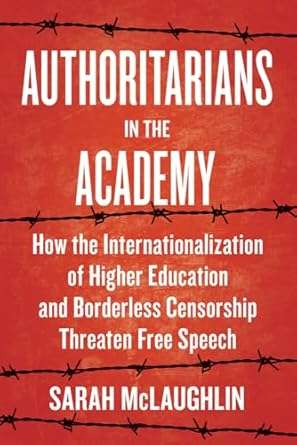The Volokh Conspiracy
Mostly law professors | Sometimes contrarian | Often libertarian | Always independent
"Authoritarians in the Academy": Feeling the Chill on Canada's Campuses
The first few chapters of my book Authoritarians in the Academy: How the Internationalization of Higher Education and Borderless Censorship Threaten Free Speech are dedicated to the relationship between authoritarian governments abroad—primarily China—and U.S. campuses. But in the book's fourth chapter, I detail the ways that the Chinese government has imposed its will on campuses in free nations around the world, like Canada.
It's worrying enough to consider the reasons why students and academics on U.S. campuses may fear the consequences of offending the Chinese Communist Party, or how administrators may worry that they need to augment their operations to protect funding opportunities originating from China. But it becomes a concern of significantly greater magnitude when you look at this issue in its full scope. This is a challenge across higher education as a whole, not just in isolated countries.
What happens to the way we research, teach, discuss, and debate authoritarian nations when those same nations are seeking to remake higher education in their image on a global scale? The long term risks to the way all of us, now and in the future, understand the world we live in are severe. But so are the risks to the individuals who today bear the brunt of those repercussions, like Canada's student activists.
An excerpt:
Even in Canada, China's repression is not far away. Such has been the case for some common targets of the Chinese government—like Hong Kong democracy activists, Uyghurs, Tibetans, and Falun Gong practitioners—who are located in Canada. These individuals have faced tactics including threats, harassment, intimidation, vandalism, surveillance, and violence, often from groups and individuals loudly supportive of Beijing and likely including government agents. The intended outcome? The export of China's censorship regime to freer communities overseas.
I spoke to one of those individuals, Chemi Lhamo, about the abuse she suffered after daring to run for—and win—a student leadership position at the University of Toronto Scarborough as a Tibetan-Canadian. "My campaign wasn't even about raising awareness for Tibet, it was about protecting student interests," Lhamo told me. She had been personally involved in activism regarding Tibet as a student and was open with her identity, often wearing a chuba, a traditional Tibetan garment, on campus. But Lhamo said her 2019 campaign was intended to reach all students, including Chinese students. She focused on issues like housing and wages, rather than her activism for Tibet. For the most part, ahead of the election for student union president, nothing much happened, at least nothing to hint at the wave of harassment she would soon receive.
The night of the election, Lhamo slept in her office, awaiting the results. It became clear she would win the next day, but Lhamo's opportunity for celebration was quickly cut short. Ahead of the announcement of her victory, fellow students began circulating her photo on WeChat, thousands of signatories added their name to a petition demanding her removal, and trolls filled Lhamo's social media accounts with abuse. Lhamo sent me some of the ugly, politically and sexually charged messages she received on Instagram. A sampling included: "Tibet always belongs to China … fuck you bitch," "fuck u bitch your mother is dead," "China is your daddy," and "Your mom is a whore, you are a whore."
The comments veered into even darker territory: "Ur not going to be the president of UTSC. Even if u do, we will make sure things get done so u won't survive a day. Peace RIP," "U can say whatever u want but ur mom die," and "Degenerates like you belong on a cross." Lhamo said there were rape threats, and a comment about Chinese-made bullets waiting for her. It is difficult to imagine that all of this punishment could be meted out over an election to a campus leadership position.
Initially, she gave the university time to look into the threats levied against her. But that did not lead to any results; she thinks campus officials just wanted to "wipe their hands" of her situation and played down the threats because they had taken place online rather than in person. For a time, Lhamo actually had to close her campus office for her own safety. Aside from giving her a walkie-talkie to contact campus security and a meeting with a safety officer, university officials did little for her. Lhamo ultimately went to Toronto police to investigate the situation, but as of the time of this writing, she still does not know who was threatening and coordinating harassment against her.
The Chinese Consulate General in Toronto rejected questions about their potential involvement in coordination of the harassment against Lhamo, but certainly did not sound troubled by her experience. If anything, the office appeared to be openly pleased. "It is believed that this is an entirely spontaneous action of those Chinese students based on objective facts and patriotic enthusiasm," the Consulate General wrote in a statement shortly after Lhamo's election. "The Chinese government firmly opposes anti-China separatist activities by 'Tibet independence' activists who are plotting to split Tibet from China [and] the move of any country or organization to provide support or convenience of any kind to 'Tibet independence' activities."
Excerpted from Authoritarians in the Academy: How the Internationalization of Higher Education and Borderless Censorship Threaten Free Speech by Sarah McLaughlin. Copyright 2025. Published with permission of Johns Hopkins University Press.
In my posts this week, I've written about the degrading state of academic freedom and free expression in recent years. In my closing post tomorrow, I'll take a closer look at the much more recent history of the past few months and address what we can likely expect in this arena in the coming weeks and years.



Show Comments (15)